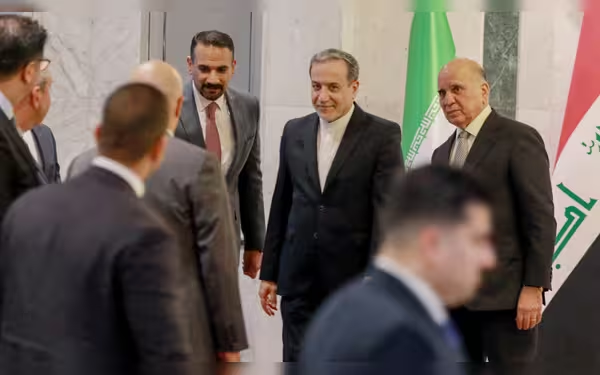Saturday, November 16, 2024 05:51 PM
Iran's Diplomatic Efforts to Halt Violence in Middle East
- Iran seeks ceasefire amid escalating Israel-Hezbollah tensions.
- President Pezeshkian condemns Israeli actions in Gaza and Lebanon.
- Foreign Minister Araghchi emphasizes peace over conflict in regional talks.
 Image Credits: arabnewspk
Image Credits: arabnewspkIran intensifies diplomatic efforts to halt violence in the Middle East, focusing on ceasefire talks amid rising tensions between Israel and Hezbollah.
In recent weeks, the Middle East has witnessed escalating tensions, particularly between Israel and groups such as Hezbollah and Hamas. As violence continues to erupt in Gaza and Lebanon, Iran has stepped up its diplomatic efforts to seek a halt to the ongoing conflict. This push for peace comes at a critical time, as fears grow that the situation could spiral into a broader regional war.
On Sunday, Iranian President Masoud Pezeshkian engaged in diplomatic discussions with French President Emmanuel Macron. The two leaders focused on finding ways to establish a ceasefire between Hezbollah and Israel. During their conversation, Pezeshkian condemned what he referred to as Israel's "crimes" in both Gaza and Lebanon, highlighting Iran's strong stance against Israeli actions.
Macron, in response, urged Pezeshkian to support a general de-escalation of tensions and to leverage Iran's influence over destabilizing actors in the region. This call for cooperation underscores the importance of diplomatic dialogue in resolving conflicts that have far-reaching implications for regional stability.
Iran's involvement in the conflict is significant, as it supports both Hamas, which is currently engaged in combat with Israel in Gaza, and Hezbollah, which is actively fighting against Israel in Lebanon. The situation has become increasingly precarious, especially after Israel vowed to retaliate against an Iranian missile strike that occurred on October 1. Such threats have raised concerns that the ongoing wars in Gaza and Lebanon could escalate into a full-blown regional conflict.
Meanwhile, Iran's Foreign Minister Abbas Araghchi was on a regional tour, visiting Iraq to discuss the ongoing wars. He emphasized that there would be "no red lines" in defending Iran's interests and people, while also expressing a desire for peace rather than war. Araghchi's statements reflect Iran's commitment to preventing further escalation and working towards a ceasefire in both Gaza and Lebanon.
During his visit to Iraq, Araghchi reiterated Iran's readiness for a potential war situation, but he stressed that the country does not seek conflict. Instead, he highlighted the importance of continued consultations to foster peace and stability in the region. Following his discussions in Iraq, Araghchi traveled to Oman, and prior to that, he met with Qatari Prime Minister Sheikh Mohammed bin Abdulrahman Al Thani, who has been mediating talks for a ceasefire in Gaza.
In addition, Araghchi's meetings with Saudi Crown Prince Mohammed bin Salman and his counterpart, Prince Faisal bin Farhan, during his visit to Saudi Arabia, indicate a broader regional effort to address the escalating violence. These diplomatic engagements are crucial as they aim to bring together various stakeholders to work towards a peaceful resolution.
As the situation continues to unfold, the international community watches closely. The hope is that through sustained diplomatic efforts, a ceasefire can be achieved, allowing for a much-needed respite from the violence that has plagued the region. The path to peace is often fraught with challenges, but the commitment to dialogue and cooperation remains essential in the quest for stability in the Middle East.













